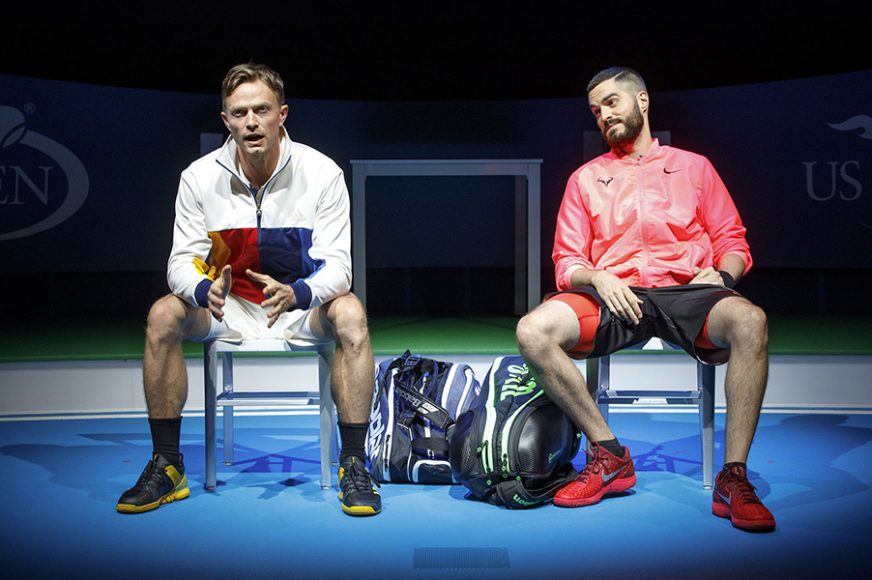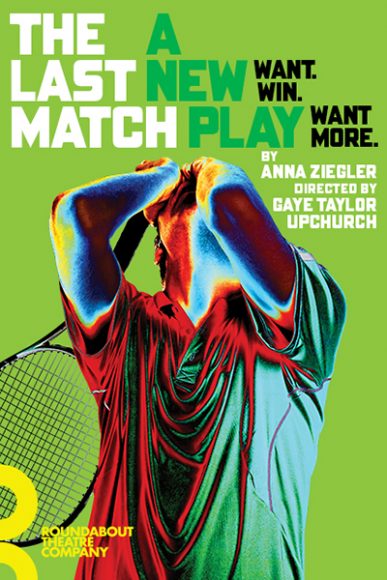This has been a great year for tennis in the arts. This past summer saw Neil LaBute’s “Break Point,” a play about two rivals locked in a cat-and-mouse game of male dominance — a favorite LaBute theme — before a French Open semifinal.
Early fall brought us “Battle of the Sexes,” an excellent dramedy based on the 1973 match between Billie Jean King (Emma Stone) and Bobby Riggs (Steve Carell) that became a media circus and feminist rallying cry.
They join a pantheon that includes a gallery of artworks, Vaslav Nijinsky’s ballet “Jeux,” the writings of David Foster Wallace, Alvaro Enrigue’s novel “Sudden Death,” Alfred Hitchcock’s psychological thriller “Strangers on a Train” and Woody Allen’s Hitchcock-inspired “Match Point.”
“I think theatrical artists are drawn to sports, because sports are in themselves theatrical,” says playwright Anna Ziegler. “Tennis, even more than other sports, is so beautifully metaphorical.”
Add Ziegler to the hall of fame of theatrical artists serving metaphorical aces. In the Roundabout Theatre Company production of her compelling play “The Last Match” (through Dec. 24 at the Harold and Miriam Steinberg Center for Theatre in Manhattan), she sets up a showdown between two male rivals on different career trajectories during a US Open semifinal. (Tim Mackabee’s set, which draws on the Open’s blue-green palette and logos, and Bradley King’s blue-white lighting combine to convey the long day’s journey into night that a taut match between top male players can be at the Queens tournament.)
The aging Tim Porter (Wilson Bethel) may be the greatest player of all time — or at least to date. (Think an American Roger Federer.) Up-and-coming Russian star Sergei Sergeyev (Alex Mickiewicz) may one day be as good, if he can just channel his raw emotions. (Think early Novak Djokovic sprinkled with reigning bad boy Nick Kyrgios.) Over the course of a match that will either be a crowning achievement for Tim or a breakthrough for Sergei, they play alongside other rivals — work and family, the individual and others, life and death.
Off the court, it’s strictly a doubles match. Tim’s wife, former pro Mallory Beth Sinclair (Zoë Winters), has the wry confidence to keep her hubby’s ego in check even as it masks her struggles to become a coach and mother and disappointment at never having been as good a player. Her opposite number is Sergei’s fiery girlfriend, Galina (Natalia Payne), a sometime model-actress who knows how to administer tough love to her guy. Any resemblance to actual players and WAGs (wives and girlfriends) is, well, complicated, reflecting the complexity of the creative process.
“I had a lot of players in mind when I started to write,” Ziegler says after a Wednesday matinee. Along the way she thought of Kyrgios, probably better known for his on-court antics than he is for his occasionally searing play. “He’s very Sergei-like, amazing potential.”
She thought about former American champions Jim Courier (“seems like a nice guy”) and Andy Roddick.
But she began with Sergei. In 2011 — the year Djokovic made his move to No. 1 — Ziegler wrote a whole play about Sergei, his coach and his girlfriend. But she couldn’t get it off the ground. And then Andy Roddick, the former US Open champ and world No. 1, retired the following year.
“I found it moving,” Ziegler remembers. “He was 30. I had already turned 30. It led to a breakthrough that got me through. It started me thinking about different themes, what it means to move on from the thing you worked so hard for. It’s a microcosm of the life cycle.”
She recalls seeing a play in which a character says that “every athlete dies twice” — in the end, for real, of course, but before that when he leaves the sport to which he’s given his all.
When Ziegler had a baby that added another layer to the play, as Tim and Mallory struggle to balance being a couple and then a family with his single-minded drive to be the best ever and her attempt to launch a coaching career.
“He even says at one point, ‘I wouldn’t get on the court if I thought there was a chance that I would lose,’” Ziegler says.
She adds that it’s harder for Mallory to be a partner than it is for Galina, because Mallory had “wanted to be a top player and had to move on.”
For Galina and Sergei, the challenges lie in memories of past tragedies and past hurts. In either case, there’s no clichéd choice between love and fame.
“These couples are very much in love,” Ziegler says.
It’s part of what makes “The Last Match” unusual, along with monologues and conversations that are punctuated by choreographed court moves, minus the rackets and balls.
“A friend described it to me as ‘a musical without songs, a ballet without tights,’” Ziegler says of the production, directed by Gaye Taylor Upchurch. It helped, Ziegler says, that “Match” had its world premiere at the Old Globe Theatre in San Diego, a theater in the round in which the movements had to be seen on all sides and that the actors had a “great day” of preparation at the USTA Billie Jean King National Tennis Center after this year’s US Open. Certainly, they look, move and act like tennis players.
“Wilson was and is a very serious player,” Ziegler says. “And Alex did the role in San Diego.”
But perhaps the most unusual aspect of “Match” is its ending, which underscores the play’s theme that win or lose, you always wind up back at deuce.
Ziegler knows all about deuce (a score of 40-40 from which a player must win two points to win the game) and every other tennis term.
“I was a serious recreational kid player,” she says of growing up in Brooklyn, “but I left it behind.”
Though not entirely. “For a long time, I thought I’d use it.”
Another childhood love was poetry. Still, her poems contained a lot of dialogue, and her experience as an English major at Yale University convinced her that she should try her hand at playwriting in graduate school at New York University. (But not before getting a master’s degree in poetry from the University of East Anglia in Norwich, England.)
Her plays include “Photograph 51” — which starred Nicole Kidman as X-ray crystallographer Rosalind Franklin, often overlooked for her work in the discovery of DNA’s double helix structure. It won the 2016 WhatsOnStage Award for Best New Play in London’s West End.
Ziegler has another work in the offing. As with “Match,” “Actually” (bowing Nov. 14 at the Manhattan Theatre Club) takes us into the minds of its characters, this time to explore sexual misconduct involving two Princeton University students.
She hopes one day to return to the theme of sports. Whatever she does, you can bet critics and audiences will be saying, “Advantage Ziegler.”
For more, visit roundabouttheatre.org and annabziegler.net.






